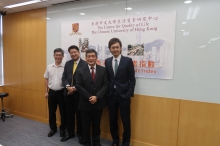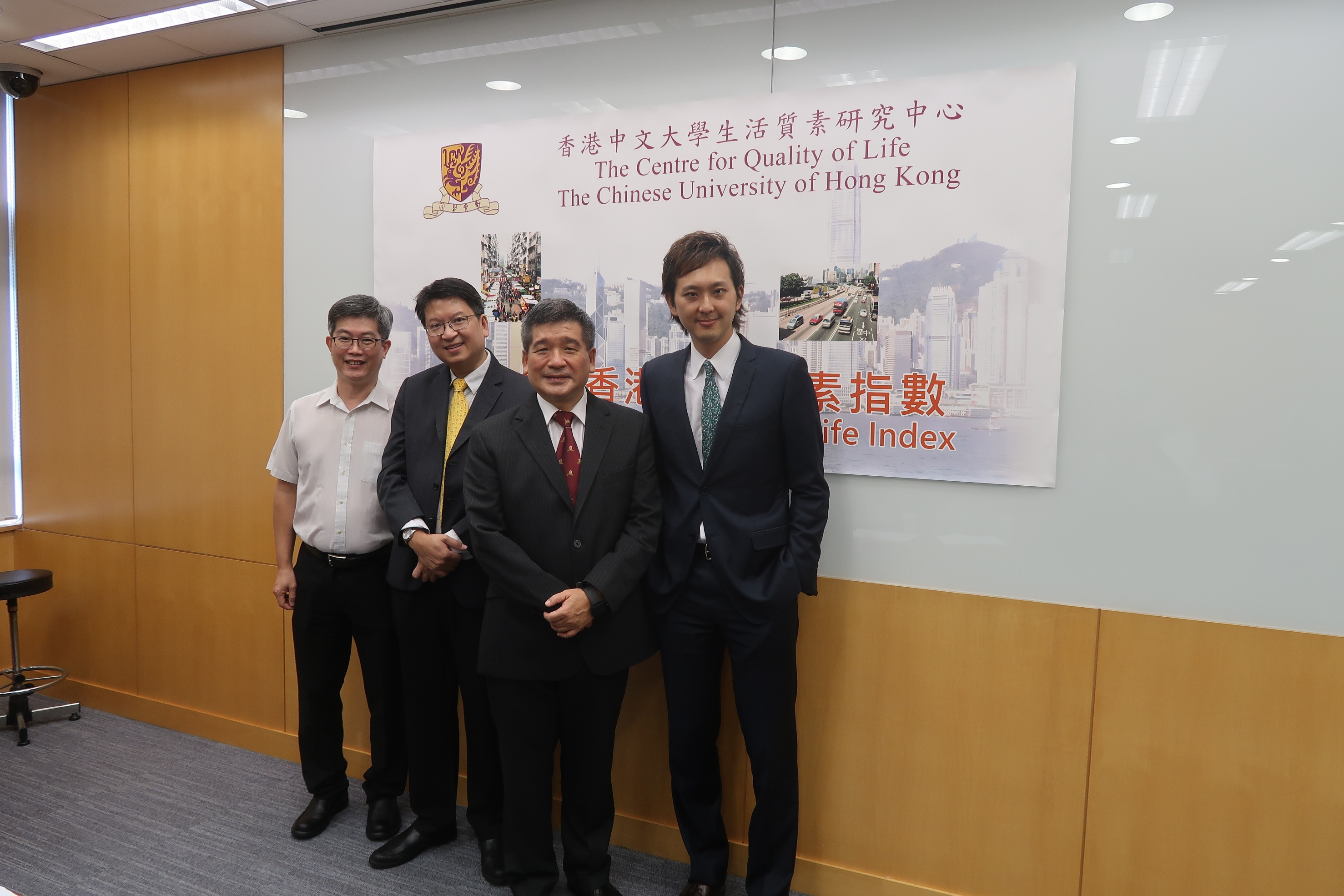News Centre
CUHK Releases Hong Kong Quality of Life Index 2019 Quality of Life Declines
The Centre for Quality of Life of the Hong Kong Institute of Asia-Pacific Studies at The Chinese University of Hong Kong (CUHK) released the “CUHK Hong Kong Quality of Life Index” 2019 (the Index) today (23 September). According to this latest Index, the overall score in 2019 was 101.39, a decrease of 3.38 points from the score in 2018 (104.76). The result indicates that the quality of life in Hong Kong declined in the past year (Appendix 1). The Economic sub-index has decreased to its lowest on record; the Environmental sub-index has increased; other sub-indices including the Health sub-index, the Social sub-index and the Culture and Leisure sub-index have decreased.
The Index consists of 23 indicators that are grouped into five sub-indices: Health, Social, Culture and Leisure, Economic, and Environmental (Appendix 2). The indicators are selected according to their coverage, representativeness, measurability, and importance to the quality of life of Hong Kong people. The higher the indicator scores, the better it performs.
Compared with 2018, the Health, the Social, the Culture and Leisure, and the Economic sub-indices have dropped in 2019, while the Environmental sub-index improved (Appendix 3). In particular, the Economic sub-index decreased by 14.69% (1.75 points) to 10.15, it was the lowest on record. The Health sub-index decreased by 3.52% (0.87 points) to 23.75. The Social sub-index decreased by 3.07% (0.89 points) to 28.18. The Culture & Leisure sub-index decreased by 1.34% (0.24 points) to 17.78. The Environmental sub-index increased by 1.76% (0.37 points) to 21.53.
10 out of the 23 indicators improved in 2019 (Appendix 4). Noticeable increases in the index of public expenditure on education as a proportion (in %) of the GDP, the real rental index and the index of public expenditure on health as a proportion (in %) of the GDP were observed, with 23.88%, 10.15% and 9.02% increases between 2018 and 2019, respectively. The enrolment rate of the relevant age group of 17-20 for first-year-first degree places of UGC-funded programmes, the press criticism index, recycle rate municipal solid waste index and the recreation and sport activities participation index also improved by 7.64%, 5.06%, 3.14% and 2.73% accordingly. The increases in the remaining indicators were relatively mild, ranging from 0.97% to 1.49%. Among the 10 improved indicators, 3 of them have increased to the highest on record (Appendix 1). The overseas travel index has improved for the sixteenth consecutive year, and the index of the enrolment rate of the relevant age groups for first-year-first degree places of UGC-funded programmes has increased for the tenth consecutive year.
Compared with 2018, 8 out of the 23 indicators worsened in 2019 (Appendix 5). The government performance index, the index of current economic condition and the stress index showed noticeable decrease, with 33.68%, 14.35% and 14.00% decrease to record lows between 2018 and 2019. The freedom of speech index and the housing affordability ratio decreased substantially and again hitting record low, with 11.16% and 10.41% decreases between 2018 and 2019, The general life satisfaction index also decreased with 8.30% between 2018 and 2019. The overall crime rate and the unemployment rate decreases in the remaining indicators were relatively mild, ranging from 2.00% to 3.88%. Among the 8 worsened indicators, 3 of them have decreased to the lowest on record in 2019 (Appendix 1). The freedom of speech index has decreased for the tenth consecutive year.
The “CUHK Hong Kong Quality of Life Index” was designed by the Faculty of Social Science in 2003. This composite index is intended to measure and keep track of the quality of life in Hong Kong in the 21st century, and to provide policy makers and the community with a useful reference tool. It also aims at raising the awareness of the need to improve the quality of life of Hong Kong people. To continue this mission, in 2006, the Centre for Quality of Life was set up by the Hong Kong Institute of Asia-Pacific Studies, CUHK to conduct on-going quality of life research and release the latest Index annually. Since 2012, the Centre for Quality of Life of the Hong Kong Institute of Asia-Pacific Studies has also compiled the “MTR-CUHK Youth Quality of Life Index”. The results of these two indices can be used for comparison and cross-reference.
2002 was the base year of the “CUHK Hong Kong Quality of Life Index”, and the value of the Index for that year was set at 100. If the value of the Index of a subsequent year is above 100, it means that the quality of life in Hong Kong in that year is better than that of 2002. If the value of the Index is below 100, it reveals that the quality of life in Hong Kong in that year is worse than that of 2002. If the value of the Index is 100, it indicates that the quality of life in Hong Kong in that year is the same as that of 2002.
In order to measure and monitor more aspects of the quality of life in Hong Kong, based on the stage of social development, the research team at the Centre for Quality of Life of the Hong Kong Institute of Asia-Pacific Studies refines the composition and calculation methodology of the Index from time to time. From 2014 onwards, the number of sub-indices of the ‘CUHK Hong Kong Quality of Life Index’ has been increased from three to five, namely, Health, Social, Culture and Leisure, Economic and Environmental sub-indices. The number of indicators included in the Index has been increased from 21 to 23.
The telephone survey of the “CUHK Hong Kong Quality of Life Index” 2019 was sponsored by Department of Government and Public Administration, Department of Social Work, Department of Psychology, Lau Chor Tak Institute of Global Economics and Finance, and School of Journalism & Communication.
For more information on the “CUHK Hong Kong Quality of Life Index”, please visit the website of the Centre for Quality of Life, Hong Kong Institute of Asia-Pacific Studies, CUHK: www.cuhk.edu.hk/hkiaps/qol.

(From left) Prof Ng Sai-leung, Associate Professor, Department of Geography and Resource Management, Prof Chong Tai-leung Terence, Associate Professor, Department of Economics, Prof Wong Hung, Director, Centre for Quality of Life, HKIAPS and Associate Professor, Department of Social Work, and Prof Chung Yat-nork Roger, Assistant Professor, The Jockey Club School of Public Health and Primary Care, CUHK
